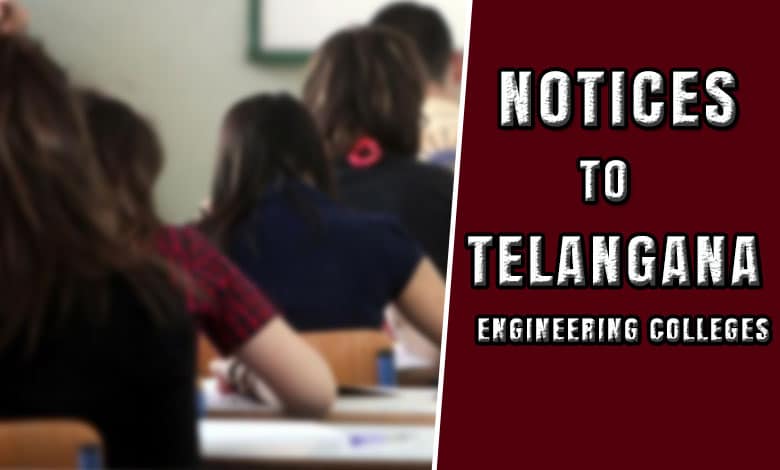Telangana Engineering Colleges Face Notices for Admission Violations: Key Details
The Telangana State Council of Higher Education (TSCHE) uncovered that numerous private engineering colleges in the state had breached regulations governing admissions under the management quota.

Hyderabad: Several engineering colleges in Telangana have come under scrutiny after being found guilty of multiple admission violations. The Telangana State Council of Higher Education (TSCHE) issued notices to these institutions for violating admission guidelines, which include early admissions, merit-based discrepancies, and exorbitant fee charges. The issue has raised concerns about the transparency and fairness of the admission process in private engineering colleges in the state.
Admission Violations in Telangana’s Private Engineering Colleges
The Telangana State Council of Higher Education (TSCHE) uncovered that numerous private engineering colleges in the state had breached regulations governing admissions under the management quota. According to the official rules, 70% of seats in these colleges should be filled through convener quota via the TG EAPCET web-based counseling system, while the remaining 30% should be filled under the management quota.
Also Read: Telangana Sees 61% Rise in Fine Paddy Cultivation Following Rs 500 Bonus Announcement
However, many colleges were found guilty of not adhering to the prescribed procedures for filling management quota seats. Specifically, colleges are required to advertise available management quota seats in at least three leading newspapers. Yet, numerous institutions failed to comply with this guideline, thus violating the admission protocol.
Early Admissions and Fee Irregularities
One of the primary violations identified in the investigation was the early admission process. Some engineering colleges in Telangana started enrolling students under the management quota as early as May 2024, which was before the official notification issued on July 31, 2024. This premature admission process went against the timelines set by the authorities and led to multiple irregularities.
Moreover, there were significant concerns regarding the overcharging of fees. The colleges reportedly disregarded merit by admitting students based on criteria other than those stipulated in the official guidelines. According to the TSCHE, the violation of the merit-based admission system resulted in students being overcharged and placed in courses without regard to their merit rank.
Violations of Merit-Based Admission Criteria
The Telangana Government’s regulations for engineering admissions include strict merit-based criteria to ensure that the best students are admitted. The rules state that:
- NRI Quota: A maximum of 15% of seats in engineering colleges can be filled with NRI candidates.
- Merit-based Allocation: Vacant NRI seats must be filled by students who have qualified in JEE Main or TG EAPCET.
- Intermediate Performance: In cases where seats remain vacant, candidates with a minimum of 45% in Intermediate (or 40% for reserved categories) may be considered based on merit.
However, several institutions ignored these criteria, admitting students outside of the prescribed merit list and violating the merit-based allocation system. These deviations have led to questionable admissions and increased concerns regarding fairness in the engineering admission process.
Action Taken by TSCHE: Withholding Ratification and Demanding Explanations
As a result of these violations, the Telangana State Council of Higher Education (TSCHE) has taken strict action. The Council has withheld the ratification of admissions for the affected colleges, pending further investigation. Additionally, TSCHE has issued notices to the management of these institutions, demanding explanations for the violations and requesting clarification on how these admissions were processed outside of the legal guidelines.
Implications of the Violations for Students and Institutions
These irregularities have raised serious concerns about the admission process in private engineering colleges across Telangana. Students who were admitted under these questionable conditions may face difficulties, especially if their admissions are eventually invalidated or revoked. On the other hand, institutions found guilty of violating admission guidelines may face severe penalties, including suspension or cancellation of their accreditation, affecting their reputation and future student intake.
Conclusion: Strengthening the Admission Process in Telangana
The recent violations in engineering college admissions highlight the importance of strict regulation and oversight in the higher education sector. As Telangana continues to grow as an education hub, it is crucial that all institutions adhere to the prescribed admission rules to ensure fairness, transparency, and the protection of students’ rights. The actions taken by TSCHE to address these issues set an example for other states and demonstrate a commitment to maintaining integrity in the admission process.
